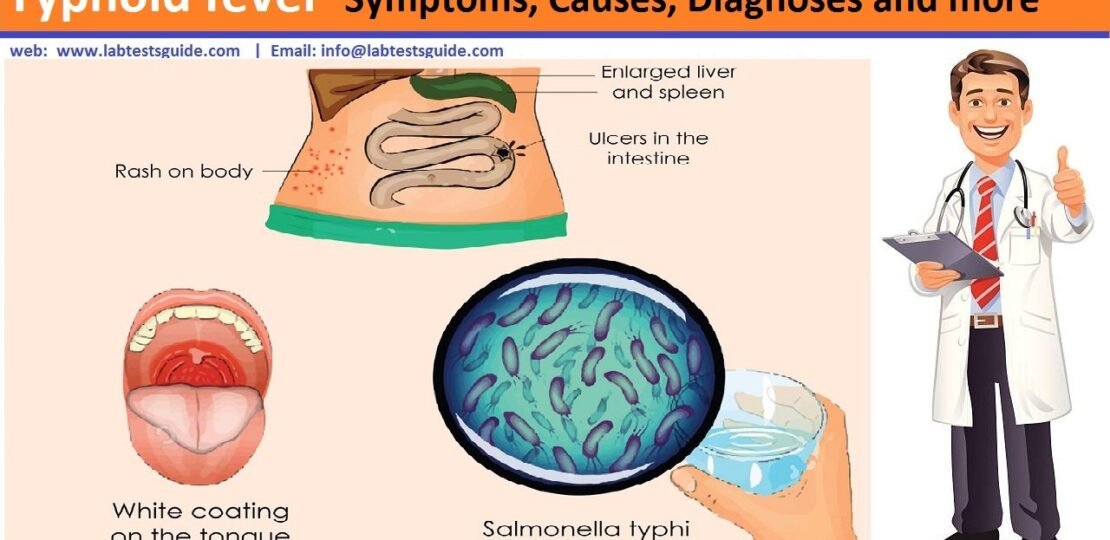
Typhoid fever, also known simply as typhoid, is a bacterial infection due to a specific type of Salmonella that causes symptoms. Symptoms may vary from mild to severe, and usually begin 6 to 30 days after exposure. There is often a gradual onset of high fever for several days.

Related Content: Typhidot Test, Widal Test, CBC, Blood Culture, Urine Culture, Stool Culture, Bone Marrow
Symptoms:
Signs and symptoms are likely to develop gradually .
Common Symptoms:
- High Fever
- Headache
- Abdominal Pain
- Constipation
- Diarrhea
Detailed Signs and Symptoms:
- Salmonella infection is more common in children less than 10 years of age.
- Prodromal stage: There is malaise, headache, cough, sore throat, abdominal pain, and constipation.
- Diarrhea is late symptoms and is usually in the third week of illness.
- Fever: It is constant and ascends in a stepwise pattern.
- 7 to 10 days: There is Paek and patients are sicker.
- Early diarrhea.
- Abdominal distension.
- Patients improve after 7 to 10 days.
- Untreated cases recover in about 4 weeks.
- Symptoms disappear with antibiotics within 3 to 4 days.
- Relapse may occur after 2 weeks.
- The gastroenteritis incubation period is 8 to 24 hours.
- There are nausea and vomiting.
- There is abdominal pain.
- There is diarrhea.
- There may be a fever.
- This is self-limiting disease and recovery is usually within a week.
Sauses of Typhidot:
- Contaminated food (including meat).
- Contaminated water supply.
- Washing fruit, vegetables and vessel can spread it, if contaminated water is used.
Diagnoses:
- CBC Test: Shows Low TLC (WBC).
- Blood culture, positive in the first week of infection in 80 % of the cases. But blood culture may reach 90 % of the cases and it decreases to 50% in the third week.
- Bone marrow culture if taken will be positive and may have a high yield of up to 90% sensitivity.
- Stool culture will be a positive but not reliable test. This will be positive within the first 7 days of infection.
- Widal test will be positive after 7 to 10 days of infection.
- Typhidot test claimed by the manufacturing companies that it will be positive after 2 to 3 days.
- Urine culture may be done and is positive in the case of enteric fever but is less sensitive.
Treatment:
- The drug of choice is the Ciprofloxacin.
- Chloramphenicol is also effective but this may have a serious side effect.
- Co-trimoxazole is also used and has less serious side effects like Chloramphenicol.
Prevention Of The Disease
- The Hygenic measure like:
- Clean water supply.
- Adequate disposal of the sewage material.
- Washing of the hands after the defecation. The best is to wash your hands with soap at least three times.
- Take care of food handling and processing.
- For the carriers, give them treatment and advise them to wash hands after the defection.
- Vaccination should be advised in the family where there is a history of enteric fever.
- Injectable vaccine.
Related Articles:
RSS Error: https://www.labtestsguide.com/category/conditions/feed is invalid XML, likely due to invalid characters. XML error: > required at line 381, column 16
RELATED POSTS
View all
